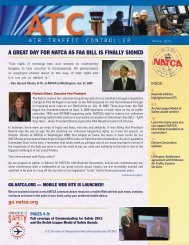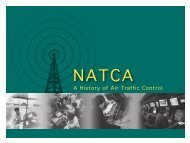Against the Wind - National Air Traffic Controllers Association
Against the Wind - National Air Traffic Controllers Association
Against the Wind - National Air Traffic Controllers Association
Create successful ePaper yourself
Turn your PDF publications into a flip-book with our unique Google optimized e-Paper software.
Michael<br />
McNally<br />
<strong>Air</strong> <strong>Traffic</strong> Control<br />
Specialist<br />
1982 — Pr e s e n t<br />
Op e r a t i n g in i t i a l s: XO<br />
HOm e t O w n : New York City<br />
CHildre n:<br />
Shannon, Erin<br />
NATCA archives<br />
ATC FACiliTies<br />
Cu r r e n t:<br />
pr e v i O u s:<br />
ZNY Center<br />
Michael McNally always had his eyes in <strong>the</strong><br />
sky. He graduated from <strong>the</strong> specialized Aviation<br />
High School in Queens, New York, and joined<br />
<strong>the</strong> <strong>Air</strong> Force. He wanted to become a military<br />
controller, but was stymied by a ten-month waiting<br />
list. Instead, he learned electronics and applied to<br />
<strong>the</strong> FAA after leaving <strong>the</strong> service. Hired in 1982,<br />
McNally found <strong>the</strong> academy exciting and hoped to<br />
settle in happily at New York Center.<br />
Realities of <strong>the</strong> post-strike workplace soon<br />
tempered his dream. Training became an ordeal<br />
when a supervisor sexually harassed a married<br />
woman at <strong>the</strong> facility. McNally verified her allegations<br />
and endured harsh reprisals from <strong>the</strong> supe.<br />
He survived after ano<strong>the</strong>r manager took McNally<br />
under his wing and certified him as a journeyman.<br />
Like his colleagues, however, McNally <strong>the</strong>n grew<br />
weary of working six-day weeks to keep pace with<br />
skyrocketing traffic.<br />
Consequently, he willingly heeded <strong>the</strong> call<br />
when former PATCO controller Ed Day, newcomer<br />
Steve Bell, and o<strong>the</strong>rs talked about ano<strong>the</strong>r union.<br />
After NATCA was certified, McNally served for<br />
four years as New York Center’s first elected president.<br />
His union perspective was founded on a<br />
desire to work cooperatively with management. A<br />
receptive manager agreed with that philosophy,<br />
and <strong>the</strong> two laid <strong>the</strong> groundwork for what became<br />
a major labor-management initiative in <strong>the</strong> early<br />
Pr e v i o u s NATCA Po s iT i oN s / AC h i e v e m e N T s<br />
<strong>National</strong> president 1997-2000; executive vice president<br />
1994-97; national QTP coordinator; national<br />
president emeritus; N.Y. Center local president.<br />
hir e d<br />
Jan.<br />
1982<br />
1990s known as Quality Through Partnership.<br />
McNally’s vision of collaboration continued<br />
during his term as executive vice president. He encouraged<br />
expansion of a budding roster of NATCA<br />
liaisons and technical representatives, which<br />
boosted controller influence in FAA projects while<br />
saving <strong>the</strong> agency time and money.<br />
His election as president in 1997 came shortly<br />
after NATCA won <strong>the</strong> right to legally bargain<br />
over pay. The union was also finishing a massive<br />
project to restructure facility and pay classifications.<br />
Hoping to negotiate a compensation package<br />
that fairly represented controller workloads,<br />
McNally understood <strong>the</strong> need for cooperation more<br />
than ever. His successful talks with FAA Administrator<br />
Jane Garvey fur<strong>the</strong>r solidified <strong>the</strong> labor-management<br />
partnership in a contract that rewarded<br />
controllers with substantially larger paychecks.<br />
Although some union members accused<br />
McNally of not communicating enough, he defends<br />
his style as a necessary strategy. “I would have<br />
tipped my hand,” he says. “I had to keep things<br />
close to <strong>the</strong> vest.”<br />
After nine years away from home, McNally<br />
left office in 2000 to spend more time with his<br />
wife, Maria, and two daughters. Coming on <strong>the</strong><br />
heels of <strong>the</strong> historic contract and direct affiliation<br />
with <strong>the</strong> AFL-CIO, he remains wistful about stepping<br />
down. “It’s <strong>the</strong> best job I ever did,” he says.<br />
“The hardest job I ever did.”




